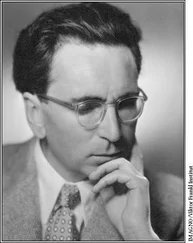“I think I shall have no other choice than to tolerate your tedious presence in the corridors of Fuld Hall,” Von Neumann announced, slowly rising from his chair. “But don’t go thinking this is paradise, Bacon. I am going to make you work like a mule until you end up despising every last equation I give you to solve. Be at my office next Monday.”
Von Neumann walked toward the staircase. The irritated voice of Klara Dan once again came bounding down from the second floor. Before retiring to his upstairs quarters, Von Neumann turned to Bacon one last time.
“If you don’t have anything better to do, you can stay for the party.”
In December of 1941, John von Neumann’s prediction came true, and the United States of America had no other choice but to enter the war. President Roosevelt had decided to remain neutral until the last possible moment, and the Japanese executed the best possible strategy: the surprise attack. The American public was shocked and outraged. Citizens from every walk of American life were angered and horrified.
HYPOTHESIS III: On Einstein and Love
By the time he had settled into his life in the United States, toward the end of 1933, Einstein was already something of an international genius, his mere image capable of inspiring even those unable to comprehend the slightest bit of physics. Having achieved this mythic status, the author of relativity amused himself by responding to his admirers’ innocent questions with riddles and paradoxes, brief as Buddhist parables. With his long, tangled mane of graying hair and his eyes, encircled by a frame of wrinkles, he was a hermit delivered to save the modern world, so desperately in need of his help. Journalists flocked to his home on Mercer Street seeking his opinion on every topic under the sun. A modern-day cross between Socrates and Confucius, Einstein obliged them with the serene benevolence of a teacher addressing the timid ignorance of his pupils. Stories of these press conferences quickly began to circulate from one end of the country to the other, as if every one of his answers were some kind of Zen koan, a Sufi poem, or a Talmudic aphorism. On one occasion, a reporter asked Einstein the following question:
“Is there such a thing as a formula for success in life?”
“Yes, there is.”
“What is it?” asked the reporter, impatient.
“If a represents success, I would say that the formula is a=x+y+z , in which x is work and y is luck,” explained Einstein.
“What is z, then?” questioned the reporter.
Einstein smiled, and then answered: “Keeping your mouth shut.”
These stories, brief and concise, only served to enhance his prestige, but at the same time, they fueled the ire of his enemies. In those days, the world was divided into two camps: those who adored Einstein and those who, like the Nazis, would have done anything to see him dead.
In 1931, when Einstein was in Pasadena to deliver a lecture at the California Institute of Technology, Abraham Flexner first approached him to join the Institute for Advanced Study, which was soon to be inaugurated at Princeton University. Flexner would make the same proposal to Einstein once again, when the two men found themselves at Oxford University in 1932.
“Professor Einstein,” he said as they walked through the gardens of Christ Church College, “it is not my intention to dare to offer you a position at our institute, but if you think about it and feel that it might meet your needs, we would be more than disposed to accommodate whatever requirements you might have.” Einstein replied that he would think about it, and in early 1933 the political climate in Germany forced him to accept the offer.
By the early 1930s, members of Hitler’s party were winning more and more seats in the Reichstag. In the 1932 elections, for example, more than two hundred Nazi deputies joined the ranks of the Reichstag, which was now under the control of the artful, cagey Hermann Goering. Around that time, Einstein and his second wife, Elsa, realized that sooner or later they would have to flee Germany. A third telephone call from Abraham Flexner, this time to Einstein’s home in Caputh, in the outskirts of Berlin, convinced the couple to cross the Atlantic. Taking advantage of the new season of conferences and lectures in the United States, Einstein promised Flexner that he would pay a visit to the institute, which would allow him to finally make a decision regarding the offer. Upon leaving their home, Einstein looked at his wife’s careworn face and in the admonishing tone he reserved for truly tragic moments, he said to her: “Dreh’ dich um. Du sieht’s nie wieder.” That is, “Don’t turn around. You’ll never see it again.” In January of 1933, Einstein was at the conference in Pasadena when Hitler was named chancellor of the Reich by President Von Hindenburg. In one interview, Einstein confirmed the prediction he had recently made to his wife: “I won’t be going home.”
Taking care not to go anywhere near Germany, Albert and Elsa returned to Europe, where Einstein still had several academic commitments to fulfill. Goering, in the meantime, wasted no time in denouncing the communist conspiracy behind “Jewish science” during one of his incendiary speeches in the Reichstag, disavowing Albert Einstein as well as his life’s work. Several Nazi assault units broke into the physicist’s home in Caputh, in search of the armaments that they were certain the communists had stored there.
Einstein then paid a brief visit to the Belgian coast, and upon ensuring that Flexner was indeed prepared to agree to his conditions—an annual salary of $15,000 and a position for one of his assistants—he accepted the appointment at Princeton. On the seventeenth of October 1933, he disembarked from the steamship Westmoreland on Quarantine Island, New York, and from there he took a motorboat that whisked him away, incognito, to the New Jersey shore and then straight to the Peacock Inn, in the town of Princeton.
The new institute seemed to have been created exclusively for Einstein. In Flexner’s own words, it was a haven that would allow scholars and scientists to work “without being carried off in the maelstrom of the immediate.” Contrary to the current trend at universities all over the world, the study of physics at the Institute for Advanced Study was to be purely theoretical; no classes at all would be offered. At the institute, Einstein would have no other obligation than to think. A new koan would come to epitomize his life in the United States. The same—or maybe it was another—reporter asked the wise man:
“Professor, you have developed theories that have changed the way we see the world, a giant step forward for science. So tell us, where is your laboratory?”
“Here,” replied Einstein, pointing to the fountain pen that peeked out from his jacket pocket.
Einstein had a method, a practice he resorted to frequently which enabled him to contemplate certain scientific issues that otherwise would have been impossible to envision. This technique was known as Gedankenexperiment , or “mental experiment,” and despite its contradictory-sounding name, it was common practice in the days of ancient Greece. All modern science, especially physics, was based upon the use of practical experiments to prove hypotheses. A theory was considered valid if and only if reality did not betray it, if its predictions could be fulfilled rigorously and without exception. Nevertheless, since the close of the previous century, very few pure physicists were amused by the idea of locking themselves in laboratories to battle against increasingly sophisticated machinery that, in the end, only proved things they already knew. The gulf between the theorists and the experimental physicists grew wider and wider, fiercer even than the rift between mathematicians and engineers. Due to this mutual animosity, the two camps only made contact when the circumstances absolutely required it. Though they were, in fact, mutually dependent, they did all they could to avoid one another, inventing the most far-fetched excuses to get out of attending one another’s seminars and conferences.
Читать дальше












